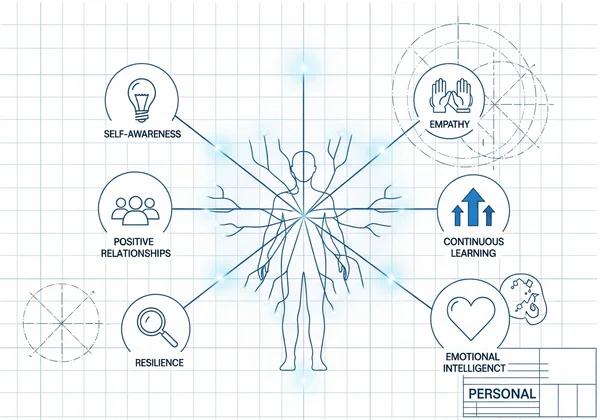High Dark Triad Test Score? Your 5-Step Self-Improvement Guide
November 20, 2025 | By Julian Vance
Just received a high dark triad score? It can be a surprising, even concerning, moment of reflection. But what if this result isn't a label, but a launchpad? What is the dark triad and how can understanding it empower you? This guide offers a positive, actionable path forward, transforming your results from the Dark Triad test into a blueprint for personal growth and awareness. We'll explore practical steps to manage traits like Machiavellianism, narcissism, and psychopathy, fostering better self-understanding and healthier interactions.
Your score is not a final judgment; it's a piece of data. It's a starting point for a profound journey of self-discovery. By leveraging these insights, you can harness your unique strengths while consciously developing areas for growth. This is your opportunity to build a more fulfilling life, grounded in awareness and intention.

Understanding Your High Dark Triad Score
Receiving a high score can feel overwhelming, but the first step is to reframe what it means. Instead of viewing it as a negative label, consider it a detailed map of your psychological landscape. This map highlights prominent features that, once understood, can be navigated with skill and purpose. This perspective is the cornerstone of dark triad self-improvement.
What the Dark Triad Traits Truly Mean for You
Let's break down the components. Machiavellianism refers to a strategic, sometimes manipulative, approach to achieving goals. Narcissism involves a strong focus on self-esteem, admiration, and a sense of grandiosity. Psychopathy is characterized by lower empathy, impulsivity, and thrill-seeking behaviors. A high score means you likely exhibit some of these dark triad traits more prominently than the average person.
This doesn't make you a "bad" person. It might mean you're highly ambitious, confident under pressure, or capable of making tough, unsentimental decisions. The key is understanding how these traits manifest in your daily life—in your career, relationships, and personal choices. Recognizing these patterns is the first powerful step toward conscious change.
Acknowledging Your Unique Strengths & Growth Areas
Every personality trait exists on a spectrum and comes with potential upsides. Your strategic thinking (Machiavellianism) could make you a brilliant leader. Your self-confidence (narcissism) might allow you to take risks others wouldn't. Your calm demeanor in a crisis (psychopathy-related traits) could be invaluable. Acknowledging these strengths is crucial.
Simultaneously, the test results highlight your growth areas. Perhaps your strategic nature sometimes alienates colleagues. Maybe your need for admiration makes it hard to accept constructive feedback. Understanding both sides of the coin allows you to start a balanced journey of personal development, enhancing your strengths while mitigating their potential downsides. Ready to begin? You can always explore your Dark Triad profile with our free tool.
Step 1: Cultivating Self-Awareness and Reflection
The foundation of any meaningful change is deep self-awareness. For individuals with pronounced Dark Triad traits, this can be particularly challenging, as a core feature can be a disconnect from one's own emotional and behavioral patterns. Therefore, making a conscious effort to observe yourself objectively is the most critical first step.
Harnessing Journaling and Behavioral Tracking
Start a simple daily practice. At the end of each day, spend ten minutes journaling about your interactions. Don't judge, just observe. Ask yourself:
- When did I feel a strong urge to get my way?
- Was there a moment I felt superior to someone else?
- Did I act impulsively without considering the consequences?
- How did my actions affect others?
This isn't about guilt; it's about data collection. By tracking your behaviors and the thoughts behind them, you begin to see patterns you were previously unaware of. This objective record is an invaluable tool for identifying specific triggers and responses you want to work on.

Seeking and Processing Honest Feedback (Strategically)
External feedback is a powerful mirror, but it can be difficult to hear, especially for those with narcissistic tendencies. The key is to approach it strategically. Identify one or two people you genuinely trust—someone who has your best interests at heart but isn't afraid to be honest.
Ask them specific, non-confrontational questions. Instead of "What's wrong with me?", try "I'm working on becoming a better listener. Was there a time in our last conversation where I might have cut you off?" This approach makes it easier for others to give feedback and for you to receive it without becoming defensive.
Step 2: Developing Empathy and Emotional Intelligence
Empathy—the ability to understand and share the feelings of another—is often a key development area for those with high Dark Triad scores. It's a skill, not an innate, unchangeable quality. Building your emotional intelligence can radically improve your relationships and overall life satisfaction.
Practicing Perspective-Taking and Active Listening
To develop cognitive empathy, make a conscious effort to see the world from another's point of view. When you're in a disagreement, pause. Before you formulate your rebuttal, genuinely try to argue their side of the issue, even just in your head. What are their motivations? What fears or hopes are driving their position?
Combine this with active listening. When someone is speaking, your goal is not to plan your response but to fully understand their message. Put away distractions, make eye contact, and summarize what you heard ("So, it sounds like you're feeling frustrated because...") before you share your own perspective.
Recognizing Emotional Triggers and Responses
Emotional intelligence also involves understanding your own inner world. Pay close attention to what triggers strong emotional reactions in you. Do you feel a surge of anger when you feel disrespected? Does criticism provoke deep-seated insecurity?
By identifying these triggers, you can create a space between the trigger and your response. In that space lies your power to choose a different path—one that is more constructive and less reactive. This self-regulation is a hallmark of high emotional intelligence and a crucial step in managing impulsive tendencies. For more insights, you can always review your Dark Triad test results again.
Step 3: Enhancing Impulse Control and Ethical Decision-Making
High scores in psychopathy and Machiavellianism can correlate with impulsivity and a "means justify the ends" mindset. Strengthening your ability to pause, reflect, and consider the broader impact of your actions is a game-changer for long-term success and healthy relationships.
Setting Boundaries and Delaying Gratification
Impulse control is like a muscle; it gets stronger with practice. Start small. Challenge yourself to delay gratification in low-stakes situations. Wait an extra 30 minutes before checking your phone. Finish a work task before taking a break.
Also, learn to set firm boundaries for yourself. If you have a tendency to make manipulative comments, make a rule that you will pause for five seconds before responding in any tense conversation. These small, consistent practices build the mental discipline needed to manage larger, more significant impulses.
Considering the Broader Consequences of Your Actions
Before making a significant decision, especially one that affects others, move beyond the immediate outcome. Use a simple framework for ethical decision-making:
- Short-Term Impact: How will this affect me and others right now?
- Long-Term Impact: What are the potential consequences a month or a year from now?
- Relational Impact: Will this build or erode trust with the people involved?
- Integrity Impact: Is this action aligned with the person I want to be?
This structured thinking process forces a more holistic view, counteracting the tunnel vision that can accompany a strong goal-oriented or impulsive drive.

Step 4: Nurturing Healthy Relationships and Communication
Ultimately, the quality of our lives is often defined by the quality of our relationships. For individuals with Dark Triad traits, interpersonal dynamics can be a source of both power and pain. Shifting the focus from control and admiration to connection and reciprocity is a profound act of self-improvement.
Building Authenticity Over Manipulation in Interactions
Manipulation may yield short-term gains, but it corrodes the foundation of any real relationship. Practice authenticity by expressing your needs and feelings directly, rather than through strategic maneuvering. It can feel vulnerable at first, but it's the only way to build genuine connection.
Start by replacing a manipulative tactic with a direct request. Instead of using guilt to get a colleague to help, try saying, "I'm under a tight deadline and could really use your expertise on this. Would you have 15 minutes to help me?" This approach fosters respect and collaboration.
Fostering Trust and Reciprocity in Connections
Trust is built on consistency, reliability, and a sense of mutual care. To build trust, you must be trustworthy. Keep your promises. Follow through on your commitments. Show up for people when they need you, not just when it benefits you.
Focus on reciprocity. Healthy relationships are a two-way street. Make a conscious effort to give as much as you take. Celebrate others' successes. Offer support without being asked. This shift from a self-focused orientation to a mutual one is the key to creating lasting and meaningful healthy relationships. The journey starts with understanding yourself, and you can begin with our Dark Triad test.
Step 5: When to Seek Professional Support
Self-help is a powerful tool, but it has its limits. Recognizing when you need expert guidance is a sign of strength, not weakness. A therapist, counselor, or coach can provide a safe, confidential space to explore these traits more deeply and develop personalized strategies for change.
Recognizing the Limits of Self-Help Resources
If you find that your behavioral patterns are causing significant distress in your life—damaging your career, destroying relationships, or leading to legal or financial trouble—it's time to seek professional help. Similarly, if you feel "stuck" despite your best efforts at self-improvement, an expert can provide the structure and insight you need to move forward.
Exploring Therapy, Coaching, and Counseling Options
Several therapeutic modalities can be effective. Cognitive Behavioral Therapy (CBT) can help you identify and change destructive thought patterns and behaviors. Dialectical Behavior Therapy (DBT) is excellent for improving emotional regulation and interpersonal skills. A professional coach can also help you translate your ambitions into ethically grounded, actionable plans. Don't hesitate to reach out to a qualified professional in your area.

Embracing Growth: Your Journey Beyond the Score
Your Dark Triad test score is not your destiny. It's a single data point on a lifelong journey of growth and self-discovery. By embracing the insights it offers and committing to this 5-step action plan, you are taking control of your personal narrative. You are choosing awareness over automation, and growth over stagnation.
This path requires courage, honesty, and persistence. But by cultivating self-awareness, developing empathy, enhancing self-control, and nurturing healthier relationships, you can channel your unique personality traits toward a more positive and fulfilling future. The journey of a thousand miles begins with a single step. You've already taken it by seeking to understand your results. Now, continue to discover your Dark Triad profile and unlock your potential for growth.
Frequently Asked Questions About Dark Triad Scores & Growth
Can a high Dark Triad score truly be changed or 'cured'?
Personality traits are relatively stable, but they are not set in stone. The goal isn't to "cure" the Dark Triad but to manage its expressions. You can learn to reduce manipulative behaviors, develop greater empathy, and control impulsivity. It's about conscious personal development and channeling your inherent traits in more productive and pro-social ways, not erasing who you are.
What if I recognize these traits but don't feel motivated to change?
This is a common and valid feeling. Motivation often follows action, not the other way around. Start with the smallest, least intimidating step in this guide, like journaling for five minutes a day. Often, the act of simply observing your own behavior without judgment can spark the curiosity and desire for change. Remember, the goal is a more effective and fulfilling life for you.
How long does it take to see improvements in Dark Triad traits?
Personal growth is a marathon, not a sprint. You may notice small changes in your awareness and interactions within a few weeks of consistent effort. However, creating lasting change in deep-seated personality patterns can take months or even years of dedicated practice. Be patient and compassionate with yourself, and celebrate small victories along the way.
Are there any positive aspects of Dark Triad traits I can leverage ethically?
Absolutely. Many traits associated with the Dark Triad can be tremendous assets when applied ethically. Machiavellianism can translate to excellent strategic planning and negotiation skills. Narcissism, when channeled positively, can fuel ambition, charisma, and resilience. Psychopathy-related traits like coolness under pressure can make for effective leaders in crisis situations. The key is to leverage these strengths while consciously building your ethical framework and empathy. Understanding your unique blend is the first step, which you can take with the dark triad test.